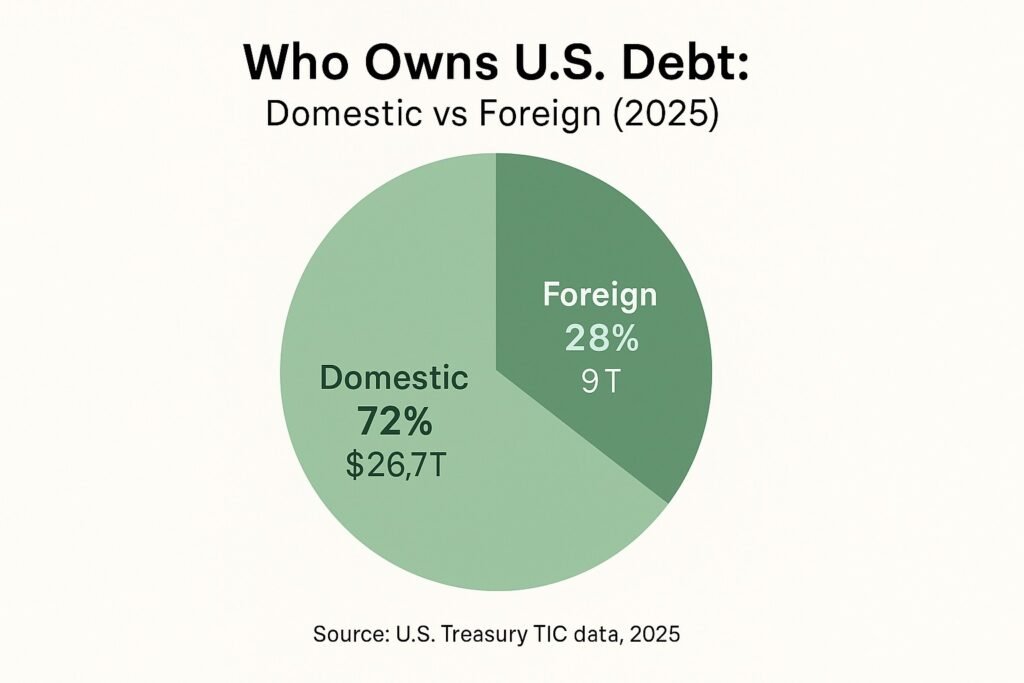The U.S. national debt has crossed $34 trillion. That’s a staggering number. But here’s what most people don’t know: who owns U.S. debt isn’t just America.
Foreign countries hold trillions of dollars in U.S. Treasury bonds. They do this for good reasons.
Why Foreign Countries Buy U.S. Debt
U.S. Treasury bonds are the world’s safest investment. Think of them as the financial equivalent of gold. They offer three key benefits:
Currency stability. Countries use dollar reserves to keep their own currencies stable.
Safe investment. Trade surpluses need somewhere safe to go. Treasuries deliver that safety.
Global trade. Most international trade happens in dollars. Holding Treasuries makes this easier.
Here’s the key point: Most U.S. debt stays domestic. Americans own about 75% through the Federal Reserve, Social Security, pensions, and private investors. Foreign holders own roughly 25%.
But that 25% still matters. It represents trillions of dollars and shapes global economics.
The Top 5 Foreign Holders of U.S. Debt
Let’s break down who owns U.S. debt internationally. These numbers come from the latest Treasury data.
#5 – Luxembourg: $404 Billion
Luxembourg punches above its weight. This tiny European nation holds $404 billion in U.S. debt.
Why so much? Luxembourg serves as a financial hub. Global hedge funds and banks park money there. They use Luxembourg to hold U.S. Treasuries on behalf of clients worldwide.
Think of Luxembourg as a safe deposit box for international money.
#4 – Canada: $438 Billion
Canada holds $438 billion in U.S. debt. This makes perfect sense.
The U.S. and Canada share one of the world’s largest trade relationships. Canadian banks need dollar-based assets. U.S. Treasuries fit that need perfectly.
Plus, the countries are neighbors. Economic ties run deep. Canadian holdings reflect this close relationship.
#3 – China: $756 Billion
Here’s where things get interesting. China once held over $1 trillion in U.S. debt. Now it holds $756 billion.
That’s the lowest level since early 2009. Why the drop?
China wants to reduce dollar dependence. Beijing is building alternatives to the dollar system. This includes promoting the yuan and creating new trade partnerships.
Still, $756 billion is massive. China remains America’s third-largest foreign creditor.
#2 – United Kingdom: $858 Billion
The UK holds $858 billion in U.S. debt. London’s role as a global financial center explains this.
Many international investors buy Treasuries through UK banks. The money might come from Asia, Europe, or the Middle East. But it flows through London’s financial system.
This is why UK holdings appear so large. London acts as a gateway for global Treasury purchases.
#1 – Japan: $1.1 Trillion
Japan tops the list with $1.1 trillion in U.S. debt. That makes Japan America’s largest foreign creditor.
Why does Japan hold so much? Several factors explain this:
Trade surplus. Japan exports more than it imports. This creates extra dollars that need investment.
Aging population. Japanese citizens save heavily for retirement. These savings flow into safe assets like Treasuries.
Currency management. Japan’s central bank uses Treasury purchases to influence the yen’s value.
Japan has held the top spot for years. Its massive holdings help fund the U.S. government.
Why Foreign Ownership Matters
So who owns U.S. debt? The answer shapes global finance in three ways:
Interest rates. If foreign demand drops, U.S. borrowing costs could rise. Higher rates affect everything from mortgages to business loans.
Geopolitics. Countries use Treasury holdings as diplomatic tools. China’s reduction sends a message about U.S.-China relations.
Financial stability. U.S. Treasuries remain the world’s safe haven. Even during crises, investors flock to American debt.
These dynamics affect markets worldwide. When major holders buy or sell, everyone notices.

The Bottom Line
Who owns U.S. debt? Mostly Americans. But foreign holders control about $8 trillion worth.
Japan leads foreign holdings at $1.1 trillion. China follows with $756 billion. The UK, Canada, and Luxembourg round out the top five.
These holdings reflect economic relationships, trade flows, and financial strategies. They also show why U.S. Treasuries remain central to global finance.
Foreign demand helps keep U.S. borrowing costs low. This benefits American consumers and businesses. It also gives the U.S. significant economic influence worldwide.
The next time someone asks who owns U.S. debt, you’ll know the answer. It’s a mix of domestic and foreign investors. Together, they fund the world’s largest economy.
Key Takeaways:
- Japan holds the most U.S. debt among foreign countries ($1.1 trillion)
- China has reduced its holdings to $756 billion, the lowest since 2009
- Foreign countries own about 25% of total U.S. debt
- Treasury holdings reflect trade relationships and financial strategies
- Changes in foreign ownership can impact global markets and interest rates





